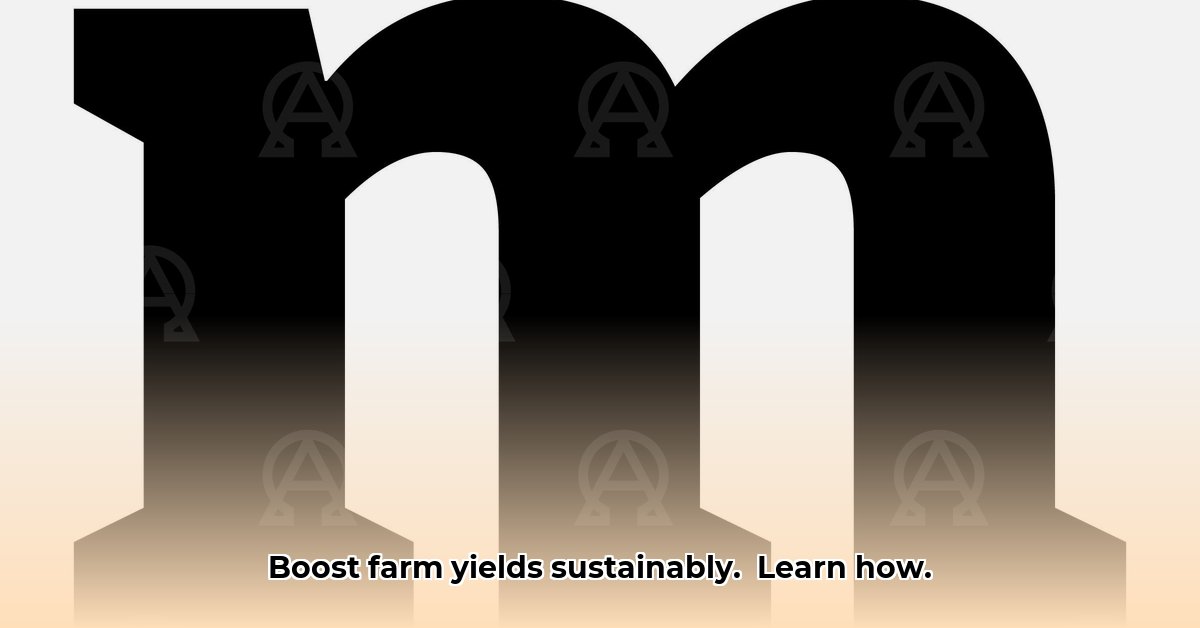
Farming sustainably isn't just a trend; it's a necessity. Higher yields and environmental responsibility can coexist, and M&W tractor parts are key to unlocking this potential. This guide provides actionable steps to improve your farm's sustainability profile using specific M&W components. We'll explore fuel efficiency, precision planting, soil conservation, and equipment maintenance to maximize both your yields and your environmental stewardship. To estimate the value of your current equipment, check out this tractor value estimator.
Choosing the Right M&W Engine for Fuel Efficiency
High fuel costs directly impact profitability. But what if you could significantly reduce these costs and your farm's carbon footprint simultaneously? M&W's fuel-efficient engines offer this dual advantage. These engines incorporate cutting-edge technologies, such as advanced fuel injection and optimized combustion chambers. This translates to greater power output from less fuel, boosting your bottom line and reducing emissions. Don't just take our word for it; studies show a substantial reduction in fuel consumption compared to older models. Isn't efficiency a crucial aspect of sustainable farming?
Optimizing Planting Precision with M&W Components
Precision planting is paramount for maximizing yields. M&W's precision planting components, including advanced seed meters and depth control systems, ensure accurate and consistent seed placement. This leads to superior germination rates, healthier plants, and ultimately, a more abundant harvest. Moreover, the reduction in wasted seeds translates directly into cost savings, minimizing both economic and environmental waste. Think about the impact: fewer seeds, less energy expended in their production, and a greener footprint.
Reducing Soil Compaction with M&W Tillage Attachments
Healthy soil is the foundation of successful farming. M&W's tillage attachments are engineered to minimize soil disturbance, preserving soil structure and promoting long-term health. Reduced tillage practices, often facilitated by these attachments, enhance water retention, nutrient absorption, and biodiversity. This approach reduces the need for fertilizers and pesticides – a win-win for your yield and the environment. Have you considered the long-term benefits of minimizing soil compaction?
Maintaining M&W Equipment for Long-Term Sustainability
Regular maintenance is crucial for maximizing equipment lifespan and operational efficiency. Following M&W's recommended maintenance schedule – including regular oil changes, filter replacements, and thorough inspections – prevents costly repairs and downtime. This proactive approach ensures smooth operation and reduces environmental impact associated with premature equipment failure. Proactive maintenance is an investment in both your farm’s profitability and its environmental responsibility. What are the long-term costs of neglecting maintenance?
Case Studies: How Farmers are Using M&W Parts for Sustainability
Real-world examples highlight the tangible benefits of sustainable farming practices utilizing M&W parts. Farmer John, using fuel-efficient M&W engines and precision planting systems, reported a 20% reduction in fuel consumption and a 15% increase in yields. Similarly, Farmer Jane’s adoption of M&W's conservation tillage attachments resulted in a 10% increase in soil organic matter, leading to improved water retention and more resilient crops. These are not isolated anecdotes; numerous farmers are experiencing similar success. Isn't it inspiring to see how farmers are achieving higher yields while enhancing environmental sustainability?
Choosing the Right M&W Parts: A Tailored Approach
Selecting the appropriate M&W parts is a personalized process. Your choices should align with specific factors including crop type, soil conditions, farm size, and individual sustainability goals. Consulting with your local M&W dealer or an agricultural expert ensures informed decision-making, optimizing your investment and maximizing positive impacts. Remember, sound advice can lead to significant long-term savings.
Key Takeaways:
- Fuel-efficient M&W engines reduce fuel costs and greenhouse gas emissions.
- Precision planting maximizes seed utilization and improves yields.
- Conservation tillage protects soil health and reduces reliance on chemical inputs.
By integrating these M&W components and practices, farmers can significantly improve the sustainability and profitability of their operations, contributing to a more environmentally responsible and productive agricultural future.